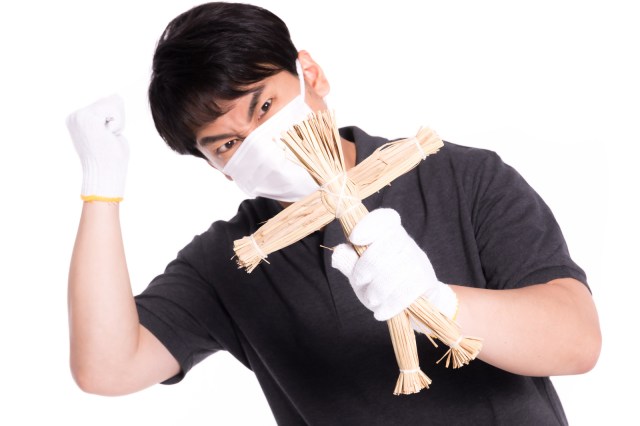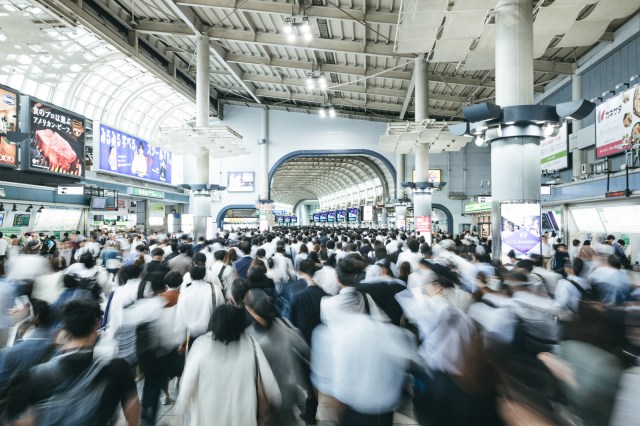
People like this are giving foreigners in Japan a bad name.
A number of countries around the world have strict quarantine laws in place at the moment, where new arrivals from abroad are required to quarantine in a hotel for two weeks–three weeks if you’re in Hong Kong–with heavy fines placed upon those who leave their hotel during this time period.
Here in Japan, however, quarantine laws are far less stringent, as people are trusted to abide by requests from the government, even now when the country is in a state of emergency. The requests include: undergoing a PCR test upon arrival at the airport, quarantining at a hotel or one’s own residence for 14 days, and pledging to refrain from using public transportation.
▼ Because public transport hubs in Japan can get really crowded.
Japan’s quarantine guidelines attempt to preserve the rights of the individual while keeping the public at large safe at the same time. However, some individuals have shown no respect for the rights given to them, nor the rights of others, by breaking quarantine, even after returning from countries where mutant strains of the virus have been found.
One such case of an individual breaking quarantine made news recently, as weekly tabloid Shukan Bunshun revealed that a foreign reporter working at Reuters Tokyo spread the mutant strain of COVID-19 after attending a party within 14 days of arriving in Japan from the U.K.
The foreign reporter had returned to England temporarily for a vacation in mid-December and tested negative at the airport upon returning to Japan. Despite being asked to quarantine at home for two weeks, the reporter went out during this period to attend a party with nine friends at a pub in Tokyo’s Minato Ward on 25 December.
▼ Home to a number of embassies and foreign corporations, Minato has one the largest foreign populations in Tokyo.
After the party, a male friend who was at the party, and the reporter’s partner, who did not attend, contracted coronavirus. After undergoing a formal test, all three were confirmed positive. The two close contacts were found to be infected with the mutant strain of corona.
The Reuters reporter admitted to breaking quarantine, telling Shukan Bunshun:
“Yes, I was there for about an hour. I was negative (when I returned to Japan), so I thought it was safe. It was a mistake to break the two-week home-waiting period. I broke Japanese guidelines and went out. I only went to that pub once.”
A Reuters spokesperson said:
“We weren’t aware of the situation and are currently investigating. We strictly adhere to travel restrictions for all staff, including in Japan, and staff are instructed to comply with local quarantine regulations and inspections.”
A day after Shukan Bunshun published the story, Reuters’ PR department sent the same statement out on Twitter, adding:
“After discovering this issue this Monday, we immediately began investigating. The employee is no longer working for us.”
— Reuters Press Team (@ReutersPR) February 10, 2021
The actions of the reporter and their employer stirred up heated debate amongst Japanese Twitter users, who commented with:
“I wonder if Reuters ignored the issue all this time.”
“Japanese show self-restraint from going out, but Westerners break the rules as much as they want without penalties.”
“Foreign nationals should be prohibited from entering the country.”
“So many of us are sacrificing seeing families right now and this person went to a party???”
“I’m sure there are Japanese people doing this too, especially when the government had its ‘go-to’ campaigns.”
“Maybe the government needs to have strict quarantine laws like overseas.”
It’s true that placing so much trust on individuals to follow guidelines without any threat of punishment can be a dangerous juggling act. However, grown adults should have a sense of responsibility when it comes to following guidelines designed to protect themselves and those around them.
That sense of responsibility should be even more profound when you’re a foreigner in Japan who has the potential to give other foreigners a bad name, particularly during the pandemic when foreign nationals have been mentioned in the news as potential spreaders of the virus. And that sense of responsibility ought to be even more important when you work in the news industry yourself and travel around the world as part of your job.
While the foreign reporter has now lost their job, they’re probably thanking their lucky stars they weren’t caught out during the current state of emergency, because the Japanese government has since added some more stipulations to their quarantine guidelines. Now, Japanese nationals who violate quarantine requests from the government may have their names made public, while foreign nationals residing in Japan run the risk of having their names and nationalities publicised and their visa revoked, resulting in deportation.
▼ Bye! Nurses working in Japan’s overburdened system won’t miss you.
So if you’re arriving in Japan from overseas, do the right thing and stay indoors for fourteen days. A negative test result at the airport doesn’t mean you won’t come down with coronavirus days later, and just because the government isn’t monitoring your every move doesn’t give you permission to act out like an irresponsible child breaking the rules at school.
Plus, fourteen days is a very short time compared to a lifetime of living with guilt over having infected someone with a potentially life-threatening illness. Japan isn’t going anywhere, and if you’re worried about missing out on fun with friends for a fortnight, trust us, they’re more likely to remain your friend if you don’t put their lives at risk by exposing them to coronavirus.
Source: Shukan Bunshun via Hachima Kiko, MOFA
Top image: Pakutaso
Insert image: Pakutaso (1, 2)
● Want to hear about SoraNews24’s latest articles as soon as they’re published? Follow us on Facebook and Twitter!



 Police with batons patrol Kabukicho, tell people to go home during coronavirus crisis【Video】
Police with batons patrol Kabukicho, tell people to go home during coronavirus crisis【Video】 Everything you need to know about quarantining in Japan
Everything you need to know about quarantining in Japan Travellers sleep on cardboard beds at Narita Airport while waiting for coronavirus test results
Travellers sleep on cardboard beds at Narita Airport while waiting for coronavirus test results Shibuya rats appear on streets as people stay home during coronavirus outbreak【Pics, Video】
Shibuya rats appear on streets as people stay home during coronavirus outbreak【Pics, Video】 “Do not travel to Japan” U.S. government tells citizens
“Do not travel to Japan” U.S. government tells citizens Highest Starbucks in Japan set to open this spring in the Tokyo sky
Highest Starbucks in Japan set to open this spring in the Tokyo sky Adorable Totoro acorn key holders come with a special guest hidden inside[Photos]
Adorable Totoro acorn key holders come with a special guest hidden inside[Photos] 7 great places to see Mt. Fuji from without having to climb it
7 great places to see Mt. Fuji from without having to climb it Tokyo day-trip hot springs: Beautiful Mt. Fuji-view bath is just one highway bus stop from Shibuya
Tokyo day-trip hot springs: Beautiful Mt. Fuji-view bath is just one highway bus stop from Shibuya Tokyo Station’s perfect breakfast spot might just be this izakaya Japanese-style pub
Tokyo Station’s perfect breakfast spot might just be this izakaya Japanese-style pub Kagoshima conveyor belt sushi chain Mekkemon rises above the rest with its special secret weapon
Kagoshima conveyor belt sushi chain Mekkemon rises above the rest with its special secret weapon Number of foreigners working in Japan hits all-time high, 25 percent come from same country
Number of foreigners working in Japan hits all-time high, 25 percent come from same country A visit to the oldest Yoshinoya chain in Japan for one last beef bowl before it closes for good
A visit to the oldest Yoshinoya chain in Japan for one last beef bowl before it closes for good Japan’s biggest manga magazine is raising its minimum payment rate for creators
Japan’s biggest manga magazine is raising its minimum payment rate for creators Japan’s oldest Yoshinoya branch reopens in a new location: Tokyo’s brand-new Toyosu fish market
Japan’s oldest Yoshinoya branch reopens in a new location: Tokyo’s brand-new Toyosu fish market The 10 most annoying things foreign tourists do on Japanese trains, according to locals
The 10 most annoying things foreign tourists do on Japanese trains, according to locals Starbucks Japan releases new sakura goods and drinkware for cherry blossom season 2026
Starbucks Japan releases new sakura goods and drinkware for cherry blossom season 2026 Naruto and Converse team up for new line of shinobi sneakers[Photos]
Naruto and Converse team up for new line of shinobi sneakers[Photos] Is Sapporio’s Snow Festival awesome enough to be worth visiting even if you hate the snow? [Pics]
Is Sapporio’s Snow Festival awesome enough to be worth visiting even if you hate the snow? [Pics] Japan has trams that say “sorry” while they ride around town…but why?
Japan has trams that say “sorry” while they ride around town…but why? Tokyo Skytree turns pink for the cherry blossom season
Tokyo Skytree turns pink for the cherry blossom season Sakura Totoro is here to get spring started early with adorable pouches and plushies
Sakura Totoro is here to get spring started early with adorable pouches and plushies Poop is in full bloom at the Unko Museums for cherry blossom season
Poop is in full bloom at the Unko Museums for cherry blossom season Shibuya Station’s Hachiko Gate and Yamanote Line stairway locations change next month
Shibuya Station’s Hachiko Gate and Yamanote Line stairway locations change next month Japan’s new “Cunte” contact lenses aren’t pronounced like you’re probably thinking they are
Japan’s new “Cunte” contact lenses aren’t pronounced like you’re probably thinking they are Japan’s newest Shinkansen has no seats…or passengers [Video]
Japan’s newest Shinkansen has no seats…or passengers [Video] Foreigners accounting for over 80 percent of off-course skiers needing rescue in Japan’s Hokkaido
Foreigners accounting for over 80 percent of off-course skiers needing rescue in Japan’s Hokkaido Super-salty pizza sends six kids to the hospital in Japan, linguistics blamed
Super-salty pizza sends six kids to the hospital in Japan, linguistics blamed Starbucks Japan unveils new sakura Frappuccino for cherry blossom season 2026
Starbucks Japan unveils new sakura Frappuccino for cherry blossom season 2026 Foreign tourists in Japan will get free Shinkansen tickets to promote regional tourism
Foreign tourists in Japan will get free Shinkansen tickets to promote regional tourism Take a trip to Japan’s Dododo Land, the most irritating place on Earth
Take a trip to Japan’s Dododo Land, the most irritating place on Earth Is China’s don’t-go-to-Japan warning affecting the lines at a popular Tokyo gyukatsu restaurant?
Is China’s don’t-go-to-Japan warning affecting the lines at a popular Tokyo gyukatsu restaurant? Survey asks foreign tourists what bothered them in Japan, more than half gave same answer
Survey asks foreign tourists what bothered them in Japan, more than half gave same answer Japan’s human washing machines will go on sale to general public, demos to be held in Tokyo
Japan’s human washing machines will go on sale to general public, demos to be held in Tokyo Starbucks Japan releases new drinkware and goods for Valentine’s Day
Starbucks Japan releases new drinkware and goods for Valentine’s Day We deeply regret going into this tunnel on our walk in the mountains of Japan
We deeply regret going into this tunnel on our walk in the mountains of Japan Studio Ghibli releases Kodama forest spirits from Princess Mononoke to light up your home
Studio Ghibli releases Kodama forest spirits from Princess Mononoke to light up your home Major Japanese hotel chain says reservations via overseas booking sites may not be valid
Major Japanese hotel chain says reservations via overseas booking sites may not be valid Put sesame oil in your coffee? Japanese maker says it’s the best way to start your day【Taste test】
Put sesame oil in your coffee? Japanese maker says it’s the best way to start your day【Taste test】 No more using real katana for tourism activities, Japan’s National Police Agency says
No more using real katana for tourism activities, Japan’s National Police Agency says Tokyo experiences drop in population for seventh consecutive month
Tokyo experiences drop in population for seventh consecutive month What state of emergency? People in Tokyo defy requests to stay home during coronavirus outbreak
What state of emergency? People in Tokyo defy requests to stay home during coronavirus outbreak Japanese Twitter user offers explanation for why Japan’s coronavirus outbreak has been so small
Japanese Twitter user offers explanation for why Japan’s coronavirus outbreak has been so small Tokyo Governor holds press conference on coronavirus, sparks immediate panic-buying
Tokyo Governor holds press conference on coronavirus, sparks immediate panic-buying Search is on for COVID-19 patient who escaped out a sixth-floor window of Osaka hotel
Search is on for COVID-19 patient who escaped out a sixth-floor window of Osaka hotel Tokyo goes dark as Governor asks for lights out in the city to help fight pandemic 【Pics, Videos】
Tokyo goes dark as Governor asks for lights out in the city to help fight pandemic 【Pics, Videos】 Japanese restaurant from the Edo Period forced to close due to coronavirus pandemic
Japanese restaurant from the Edo Period forced to close due to coronavirus pandemic Hanami cherry blossom viewing season begins in Japan as cities around the world shut down
Hanami cherry blossom viewing season begins in Japan as cities around the world shut down Fake monks scam foreign tourists out of their cash in Tokyo
Fake monks scam foreign tourists out of their cash in Tokyo Tokyo tourist sites look eerily quiet without tourists 【Videos】
Tokyo tourist sites look eerily quiet without tourists 【Videos】